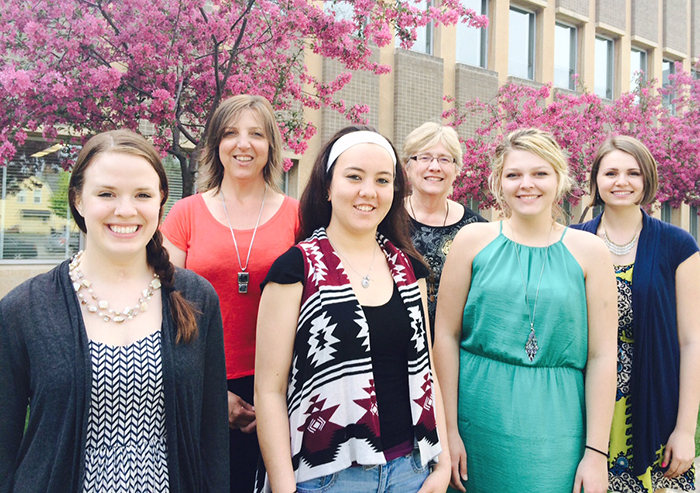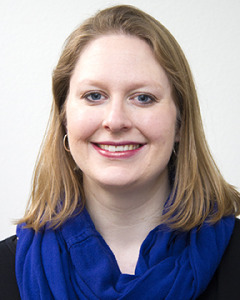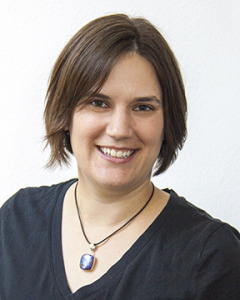Posted 4:24 p.m. Wednesday, May 27, 2015

Students in a spring semester grant writing class put their writing skills to the test to apply for funds that would help local non-profit organizations such as the La Crosse County Aging Department.
 UW-L students make a difference in the community through class work with community non-profits including the La Crosse County Aging Department. From left, Senior Kaitlyn McFadden; Amy Brezinka, La Crosse County Aging Department; Senior Angelique Kane; Noreen Holmes, La Crosse County Aging Unit; Junior Alexis Merbach; and Senior Mikaela Kornowski.[/caption]
UW-L senior Angelique Kane finished a semester-long project that had an impact far beyond a letter grade.
Kane and other students in her spring semester grant writing class put their writing skills to the test to apply for funds that would help local non-profit organizations such as the La Crosse County Aging Department, Capable Canines of Wisconsin and The Hunger Task Force of La Crosse.
[caption id="attachment_41337" align="alignright" width="240"]
UW-L students make a difference in the community through class work with community non-profits including the La Crosse County Aging Department. From left, Senior Kaitlyn McFadden; Amy Brezinka, La Crosse County Aging Department; Senior Angelique Kane; Noreen Holmes, La Crosse County Aging Unit; Junior Alexis Merbach; and Senior Mikaela Kornowski.[/caption]
UW-L senior Angelique Kane finished a semester-long project that had an impact far beyond a letter grade.
Kane and other students in her spring semester grant writing class put their writing skills to the test to apply for funds that would help local non-profit organizations such as the La Crosse County Aging Department, Capable Canines of Wisconsin and The Hunger Task Force of La Crosse.
[caption id="attachment_41337" align="alignright" width="240"] Marie Moeller, assistant professor of English[/caption]
“Our students are invested, but when it came to these projects, they were invested at a level I had never seen before,” says Marie Moeller, assistant professor of English who teaches the course.
Students saw their work have a direct impact on La Crosse — a place they now call home, adds Moeller.
Kane and three other students in her course — Mikaela Kornowski, Alexis Merbach and Kaitlyn McFadden — wrote a grant for the La Crosse County Aging Department. If funded this fall, the grant will distribute a La Crosse Senior Life newsletter to about 5,000 seniors living in La Crosse County. It includes useful information about topics from changes to Medicare to transportation services available for seniors.
“We’re addressing something that affects everyone and will one day affect us too,” says Merbach, a UW-L junior.
Kane says in addition to growing professionally by doing work for an actual client, she also grew personally. She began to better understand a segment of the population she rarely has contact with.
“The elderly is a population that is sometimes isolated and secluded from the younger population,” she says. “I can see the work both personally and professionally that’s needed to try to fill that gap.”
Marie Moeller, assistant professor of English[/caption]
“Our students are invested, but when it came to these projects, they were invested at a level I had never seen before,” says Marie Moeller, assistant professor of English who teaches the course.
Students saw their work have a direct impact on La Crosse — a place they now call home, adds Moeller.
Kane and three other students in her course — Mikaela Kornowski, Alexis Merbach and Kaitlyn McFadden — wrote a grant for the La Crosse County Aging Department. If funded this fall, the grant will distribute a La Crosse Senior Life newsletter to about 5,000 seniors living in La Crosse County. It includes useful information about topics from changes to Medicare to transportation services available for seniors.
“We’re addressing something that affects everyone and will one day affect us too,” says Merbach, a UW-L junior.
Kane says in addition to growing professionally by doing work for an actual client, she also grew personally. She began to better understand a segment of the population she rarely has contact with.
“The elderly is a population that is sometimes isolated and secluded from the younger population,” she says. “I can see the work both personally and professionally that’s needed to try to fill that gap.”
Students learn working directly with clients
The grant writing course was new this past spring semester. The development of the course was aided by a workshop offered by the Undergraduate Research and Creativity office and the Center for Advancing Teaching and Learning as part of a Regent's Research, Economic Development and Innovation grant to embed undergraduate research experiences into courses. The grant writing class is one of several client-based classes within UW-L’s Professional Writing Minor, which attracts students with majors from biology to communication. In addition to doing work for non-profits, student projects assist community and state organizations. They learn how to work with professional clients and communicate to an audience outside of academia, says Moeller. “It’s one thing to write for your teacher and it’s another to write for someone outside of academia,” notes Moeller. “These students really have multiple stakeholders in the projects they are working on and learning to negotiate those needs is the hallmark of the professional writing minor.” Since Moeller was hired in 2010 to revise the minor, enrollment has climbed from 32 students to 81 this past spring semester. The minor culminates with an internship. As students advance in the minor, they prepare for the internship experience by taking classes that are progressively more client-based and require them to think more independently. [caption id="attachment_41339" align="alignright" width="240"] Lindsay Steiner, assistant professor of English[/caption]
“I like to help students learn to think through problems that are not easily solved,” says Lindsay Steiner, assistant professor of English who teaches in the minor. “I give them the task, but how they complete it is — in a lot of ways — up to them. They gain the opportunity to learn to embrace ambiguity — push through and solve problems.”
In Steiner’s fall class, “Publishing for the Digital Age,” students developed a new visual brand identity for the La Crosse County Aging Department. Student groups developed several new designs, and generated examples of what they’d look like in a print publication and website page. The Aging Department is now in the process of implementing one of those brand identities.
Merbach, a junior in the minor, likes that her classes take a client-based approach.
“As students we sometimes forget there is a world out there outside of academia,” she explains. “It helps me break away from the books and the text and see that I can do this kind of work later on.”
Lindsay Steiner, assistant professor of English[/caption]
“I like to help students learn to think through problems that are not easily solved,” says Lindsay Steiner, assistant professor of English who teaches in the minor. “I give them the task, but how they complete it is — in a lot of ways — up to them. They gain the opportunity to learn to embrace ambiguity — push through and solve problems.”
In Steiner’s fall class, “Publishing for the Digital Age,” students developed a new visual brand identity for the La Crosse County Aging Department. Student groups developed several new designs, and generated examples of what they’d look like in a print publication and website page. The Aging Department is now in the process of implementing one of those brand identities.
Merbach, a junior in the minor, likes that her classes take a client-based approach.
“As students we sometimes forget there is a world out there outside of academia,” she explains. “It helps me break away from the books and the text and see that I can do this kind of work later on.”
